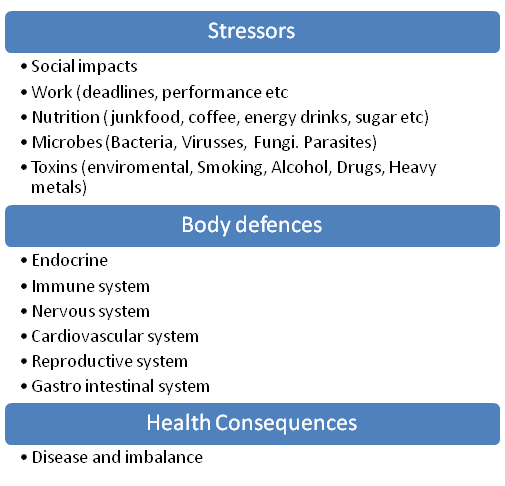|
Big boys don’t STRESS - Dr. Marlo Swanepoel STRESS?? O please, that is just the new age word… So you think that you as a man do not feel the effects of stress in your life and that you are coping just fine except for those few moments you accidently snarled at your wife or dog, or at the old lady taking forever to cross the road, or the car that pushed in front of you and you had to slam on the brakes. Or maybe you felt like bursting an artery and the steam pumping from your ears when your boss just laid more work on you, or the printer stopped working or your hand is just too big to get into this small space to fix the car... Maybe you should just continue reading as the old lady crossed that road for the last 60 years and maybe stress denial is the most effective way of killing men all over the world. So what it stress? Stress is a physiological response to a situation that is perceived as a threat. This is needed in order for you to run away or fight if your live is in danger, also known as the fight or flight response. This response is mainly regulated by your sympathetic nervous system, stimulating all kinds of cascades in the body aiding you to cope or adapt to the demands at hand. In normal circumstances stress should be short lasting but unfortunately we do not live in normal circumstances anymore and one fails to respond appropriately to psychological or physical threats and the cascades never shut down. How does stress work? In order to explain this we will look at a normal stress response also known as the alarm phase or an eustress response, meaning a good stress response. As mentioned earlier, one’s stress response is triggered by the sympathetic nervous system, due to an increase in demand or threat whether psychological or physical. Once the nervous system perceives this increase in demand or threat it triggers a general sympathetic activation as well as adrenal gland activation. This gland - situated on top of the kidneys - produces mainly adrenalin in a stress response. This activation cascade leads to the utilization of energy reserves by releasing glucose, changes in circulation such as shunting blood away from all unnecessary organs or systems, at the time of a threat, and increases blood flow to the main muscle group to assist in the fight or flight response. The heart and respiratory rates increases. The pupils dilate in order to increase awareness of your surroundings, your senses heighten and your digestion slows down. Imagine yourself being in the Kruger National Park and you see a hungry lioness ready to make you her next meal. If there was no stress response you would not be able to run away or use the environment around you to avoid becoming lunch. Once the lioness decides to go look elsewhere your sympathetic nervous system will perceive the threat as subsiding and normal rest and digest or parasympathetic nervous system will take over, thus restoring normal function and blood flow to organ systems meaning adrenalin release is decreased. Distress on the other hand is a prolonged period of stress response. These extended periods of the sympathetic responses are destructive physically, mentally and emotionally as illustrated in diagram 1. Homeostasis is disrupted leading to electoloid, hormonal and neural imbalances. Oxidative stresses are created leading to cell damage, the immune system is compromised, the brain function is altered which can cause depression, anxiety, irritability or desensitisation to pleasure and happiness. One can write a book on all the effects of distress on the body. Besides the common headaches, fatigue, irritability, muscle pains, and gastrointestinal upsets let’s have a look at 7 common complications in men due to stress: 1. Heart disease Due to the constant release of stress hormones such as adrenalin leading to an increase in heart rate, hypertension and electorloid imbalances such as a loss of K+ and NA+, the heart muscles takes severe strain and their energy reserves are depleted. This eventually leads to weakening of the muscle fibres and thickening of cardiac walls. Long standing this will lead to cardiac cell damage resulting in a heart attack or stroke. 2. Infertility Stress as mentioned earlier already alters the mood of a person, which will lead to one desiring sexual intercourse less. Besides the obvious fact that one needs to have sex in order to conceive, the excessive hormonal changes and oxidative stress, leads to a change in the main male reproductive hormones as well as a decrease in sperm count, defective sperm structure and motility resulting in infertility. 3. Erectile dysfunction and premature ejaculation Due to alteration in mental and psychological health one is unable to reach a state of arousal which will lead to a weak or short lasting erection. Furthermore as mentioned earlier the change in circulation and depletion of energy stores will decrease the blood flow to the penis which is required for a strong and healthy erection. Stress leads to a quick change from parasympathetic (rest and digest) system to sympathetic (fight or flight) which is required for ejaculation, thus chronic stress leads to premature ejaculation due to the constant sympathetic nervous system activation. 4. Prostate cancer development Although not one exact cause exists, there are many studies indicating the increase of prostate cancers in men under prolonged periods of stress. Many assumptions can be made such as an increase in inflammatory mediators leading to inflammation within the prostate, decrease in ejaculation, alterations in hormone levels and many more. All of which affects the health of the prostate gland. 5. Premature aging Many of the stress responses require one’s body to adapt which require energy, mineral and vitamin sources. In distress one depletes these reservoirs at a fast pace, meaning the cellular function is decreased. On top off the physiological responses one tends to neglect a healthy diet and exercise leading to accelerated cellular destruction and inflammation all increasing the rate of aging, collagen and elastin damage 6. Muscle growth As a result of the nutritional, neural, hormonal and electroloid imbalance the body will release more growth hormone (GH) and glucocorticoids in an attempt to restore these systems. Fat cells will respond to GH and glucocorticoids by releasing needed fatty acids as where muscle will respond by breaking down proteins and releasing amino acids into the bloodstream resulting in atrophy (muscle wasting). 7. Diabetes Due to the tremendous energy requited to keep the body going the normal glucose balance is depleted fast. This will stimulate the liver to produce glucose from other sources. Long standing all these reserves are depleted and a further imbalance in hormone, especially insulin and glucogon, is created resulting in diabetes. In conclusion As you can see maybe it is really not the old lady, or the boss, or the car. Maybe it is you not shutting down your stress responses. By keeping a healthy diet and exercising and consulting your heath care provider these effects of stress can be kept at arm’s length. By looking after yourself you will create a healthier, happier live for yourself.
2 Comments
Nenee
6/2/2024 08:05:19 am
Losing weight had always felt impossible, but this remarkable product made it happen. From 100kg to a fit 70kg, I now feel more confident than ever. <a href="https://emperorsvigortonic24.com/text.php#aff=FETIKO" target="_blank">click here</a> to embrace a healthier you!
Reply
Leave a Reply. |
AuthorsDr. Marike de Klerk Categories
All
|
All rights reserved Naturopathic Health Care Centre
ADDRESS: No 13 Hazelwood Road, Hazelwood, Pretoria
TELEPHONE: 012 460 9216
PAIA Manua
Website design and digital marketing by Plan Me Pretty (PTY) Ltd
TELEPHONE: 012 460 9216
PAIA Manua
Website design and digital marketing by Plan Me Pretty (PTY) Ltd


 RSS Feed
RSS Feed